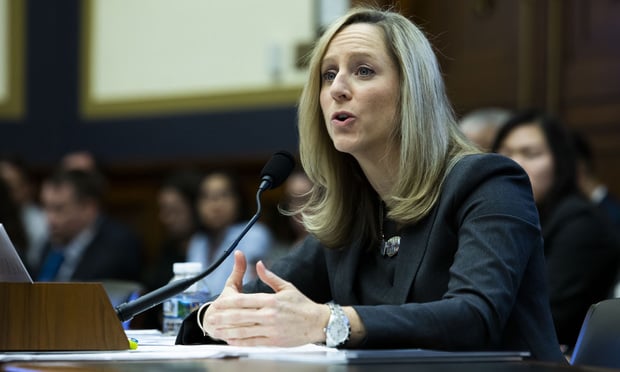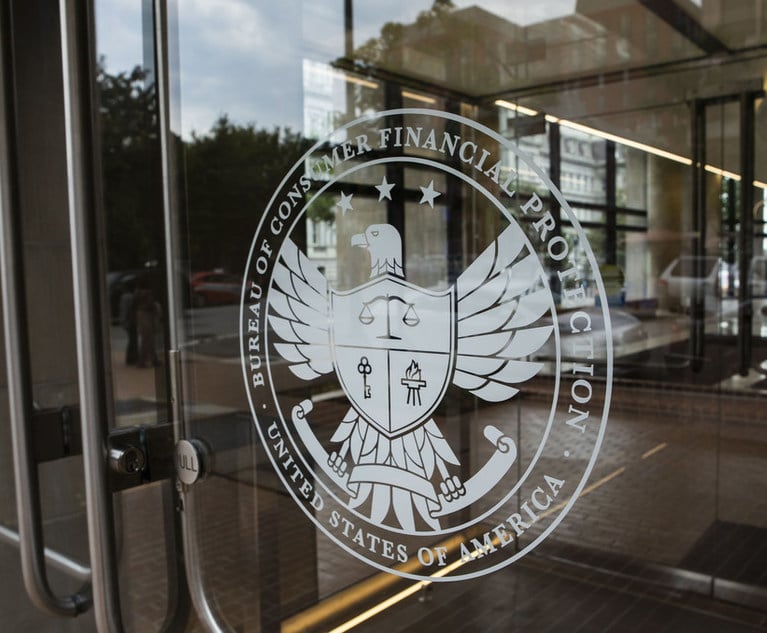CFPB, Changing Stance, Backs Law Firm Fighting Agency's Independent Design
The U.S. Justice Department is backing a California law firm challenging a Ninth Circuit ruling that upheld the constitutionality of the Consumer Financial Protection Bureau's single-director structure.
September 17, 2019 at 05:49 PM
5 minute read
 Kathy Kraninger, director of the Consumer Financial Protection Bureau, testifies at the House Financial Services Committee. (Photo: Diego M. Radzinschi/ALM)
Kathy Kraninger, director of the Consumer Financial Protection Bureau, testifies at the House Financial Services Committee. (Photo: Diego M. Radzinschi/ALM)
The White House should have the power to remove the director of the Consumer Financial Protection Bureau for any reason, the Trump administration's U.S. Justice Department, joined by the financial regulatory agency's leadership for the first time, told the U.S. Supreme Court on Tuesday.
The Supreme Court is weighing whether to hear a challenge to the independent single-director structure of the consumer agency, born from the Dodd-Frank regulatory reforms and long the target of criticism from conservatives and the financial industry. A California-based debt-services law firm, represented by a team from Paul, Weiss, Rifkind, Wharton & Garrison, has urged the justices to overturn a ruling by the U.S. Court of Appeals for the Ninth Circuit that upheld the agency's design and required the firm to comply with a demand for information about its practices.
The Justice Department on Tuesday threw its support to the challenger, Seila Law LLC, and was joined by the director of the consumer bureau, Kathy Kraninger, who was appointed by President Donald Trump. The consumer bureau, until now, had defended the single-director structure of the agency in court cases across the country. Federal law only permits a U.S. president to remove the director of the consumer bureau for cause. CFPB directors serve five-year terms.
"The United States previously informed this court that it has also concluded the statutory restriction on the president's authority to remove the director violates the Constitution's separation of powers, and that the question would warrant this court's review in an appropriate case," Justice Department lawyers wrote in the new Supreme Court filing. "The director of the bureau has since reached the same conclusion. This case presents a suitable vehicle for the court's review of the question. The government thus agrees with petitioner that certiorari is warranted."
The Supreme Court would likely appoint a lawyer to argue in defense of the Ninth Circuit's ruling, if the justices agree to hear the case this term. The case would mark the latest instance of a Trump-era agency leader switching sides at the high court. In August, the Justice Department disavowed its earlier defense of a federal court's job-bias ruling, taking a position against the U.S. Equal Employment Opportunity Commission.
The Trump Justice Department's position in the Seila Law case was not a surprise. Main Justice had earlier expressed its disdain for the consumer bureau's structure in a case at the Supreme Court.
But the government, in that earlier case, did not ask the justices to resolve the dispute. Justice Brett Kavanaugh, a critic of the single-director scheme at the CFPB, would have been forced to sit on the sidelines in that case, based on his earlier involvement in the dispute as a presiding judge on the U.S. Court of Appeals for the D.C. Circuit.
 Justice Brett Kavanaugh, U.S. Supreme Court (Photo: Diego M. Radzinschi/ALM)
Justice Brett Kavanaugh, U.S. Supreme Court (Photo: Diego M. Radzinschi/ALM)Kavanaugh's criticism of the consumer bureau's single-structure made an appearance in Tuesday's new court filing at the Supreme Court. The Justice Department quoted from Kavanaugh's writing in the D.C. Circuit case PHH Corp. v. CFPB. Kavanaugh was in the dissent in the D.C. Circuit ruling, which upheld the consumer agency's structure was lawful.
"Indeed, other than the president, the director of the CFPB is the single most powerful official in the entire United States government, at least when measured in terms of unilateral power," Kavanaugh wrote in the PHH Corp. case. He has called the power of the CFPB director "massive" and "unchecked."
Justice Department lawyers argued in their filing that a single-director agency "presents a greater risk than a multi-member independent commission of taking actions or adopting policies inconsistent with the president's executive policy." The government argued that "a single director can decisively implement his own views and exercise discretion without those structural constraints."
The Ninth Circuit panel, led by Judge Paul Watford, said Congress intentionally set up the consumer bureau to be independent. "Like the FTC, the CFPB exercises quasi-legislative and quasi-judicial powers, and Congress could therefore seek to ensure that the agency discharges those responsibilities independently of the president's will," Watford said.
The Seila Law case has attracted substantial friend-of-the-court attention from business advocates. The U.S. Chamber of Commerce, represented by Andrew Pincus of Mayer Brown, said the Supreme Court should resolve the constitutionality of the consumer bureau's structure.
"The current uncertainty regarding the legality of the Bureau's structure means that every act that the bureau takes—whether promulgating rules, issuing subpoenas, or imposing sanctions—is potentially invalid," Pincus wrote.
Read the Justice Department's new brief below:
Read more:
Current and Former Texas Solicitors General Line Up Against CFPB
Consumer Bureau Lawyer Rebuked Over Racial Remarks Is Leaving Agency
Justice Dept. Frets About Kavanaugh Recusal in Challenge to CFPB's Power
D.C. Circuit's Brett Kavanaugh Doubles Down on Criticism of CFPB
This content has been archived. It is available through our partners, LexisNexis® and Bloomberg Law.
To view this content, please continue to their sites.
Not a Lexis Subscriber?
Subscribe Now
Not a Bloomberg Law Subscriber?
Subscribe Now
NOT FOR REPRINT
© 2025 ALM Global, LLC, All Rights Reserved. Request academic re-use from www.copyright.com. All other uses, submit a request to [email protected]. For more information visit Asset & Logo Licensing.
You Might Like
View All
CFPB Resolves Flurry of Enforcement Actions in Biden's Final Week

Wells Fargo and Bank of America Agree to Pay Combined $60 Million to Settle SEC Probe

Supreme Court May Limit Federal Prosecutions Over 'Misleading' but True Statements

CFPB Alleges Berkshire Hathaway Subsidiary Originated Unaffordable Housing Loans
Trending Stories
- 1E-discovery Practitioners Are Racing to Adapt to Social Media’s Evolving Landscape
- 2The Law Firm Disrupted: For Office Policies, Big Law Has Its Ear to the Market, Not to Trump
- 3FTC Finalizes Child Online Privacy Rule Updates, But Ferguson Eyes Further Changes
- 4Chief Judge Joins Panel Exploring Causes for Public's Eroding Faith in NY Legal System
- 5Pogo Stick Maker Wants Financing Company to Pay $20M After Bailing Out Client
Who Got The Work
J. Brugh Lower of Gibbons has entered an appearance for industrial equipment supplier Devco Corporation in a pending trademark infringement lawsuit. The suit, accusing the defendant of selling knock-off Graco products, was filed Dec. 18 in New Jersey District Court by Rivkin Radler on behalf of Graco Inc. and Graco Minnesota. The case, assigned to U.S. District Judge Zahid N. Quraishi, is 3:24-cv-11294, Graco Inc. et al v. Devco Corporation.
Who Got The Work
Rebecca Maller-Stein and Kent A. Yalowitz of Arnold & Porter Kaye Scholer have entered their appearances for Hanaco Venture Capital and its executives, Lior Prosor and David Frankel, in a pending securities lawsuit. The action, filed on Dec. 24 in New York Southern District Court by Zell, Aron & Co. on behalf of Goldeneye Advisors, accuses the defendants of negligently and fraudulently managing the plaintiff's $1 million investment. The case, assigned to U.S. District Judge Vernon S. Broderick, is 1:24-cv-09918, Goldeneye Advisors, LLC v. Hanaco Venture Capital, Ltd. et al.
Who Got The Work
Attorneys from A&O Shearman has stepped in as defense counsel for Toronto-Dominion Bank and other defendants in a pending securities class action. The suit, filed Dec. 11 in New York Southern District Court by Bleichmar Fonti & Auld, accuses the defendants of concealing the bank's 'pervasive' deficiencies in regards to its compliance with the Bank Secrecy Act and the quality of its anti-money laundering controls. The case, assigned to U.S. District Judge Arun Subramanian, is 1:24-cv-09445, Gonzalez v. The Toronto-Dominion Bank et al.
Who Got The Work
Crown Castle International, a Pennsylvania company providing shared communications infrastructure, has turned to Luke D. Wolf of Gordon Rees Scully Mansukhani to fend off a pending breach-of-contract lawsuit. The court action, filed Nov. 25 in Michigan Eastern District Court by Hooper Hathaway PC on behalf of The Town Residences LLC, accuses Crown Castle of failing to transfer approximately $30,000 in utility payments from T-Mobile in breach of a roof-top lease and assignment agreement. The case, assigned to U.S. District Judge Susan K. Declercq, is 2:24-cv-13131, The Town Residences LLC v. T-Mobile US, Inc. et al.
Who Got The Work
Wilfred P. Coronato and Daniel M. Schwartz of McCarter & English have stepped in as defense counsel to Electrolux Home Products Inc. in a pending product liability lawsuit. The court action, filed Nov. 26 in New York Eastern District Court by Poulos Lopiccolo PC and Nagel Rice LLP on behalf of David Stern, alleges that the defendant's refrigerators’ drawers and shelving repeatedly break and fall apart within months after purchase. The case, assigned to U.S. District Judge Joan M. Azrack, is 2:24-cv-08204, Stern v. Electrolux Home Products, Inc.
Featured Firms
Law Offices of Gary Martin Hays & Associates, P.C.
(470) 294-1674
Law Offices of Mark E. Salomone
(857) 444-6468
Smith & Hassler
(713) 739-1250










